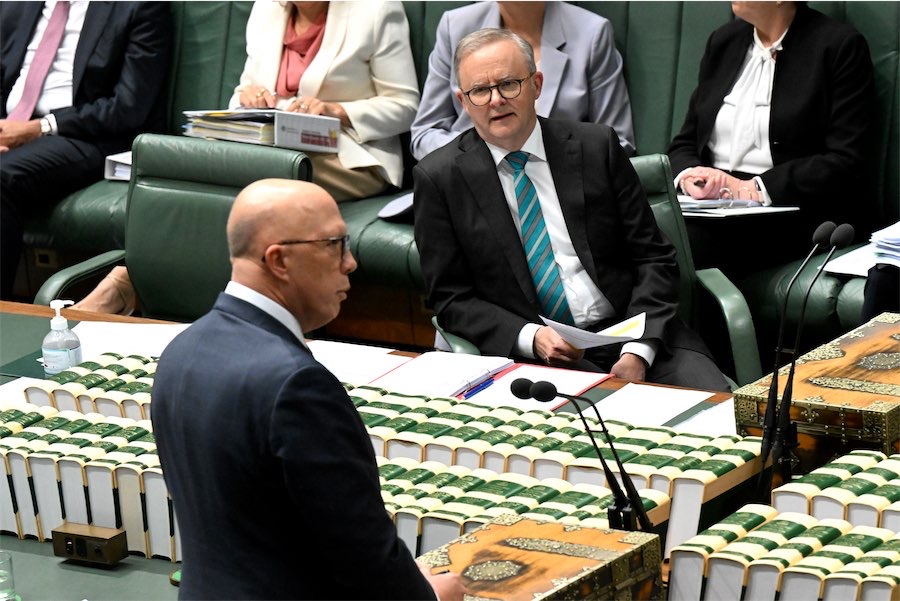By Andrew Leigh MP
JONATHAN Swift once said that ‘vision is the art of seeing the invisible’.
The ability to see through the fog of the present to the clarity of tomorrow exemplifies the great progressives of our time. From early on in his life and legal career it was clear that Keppel (Kep) Enderby was something of a master in this art.
Initially drawn to a young and burgeoning Canberra in the early 1960s to lecture in Law at Australia’s new National University, Kep wasted no time making his presence felt in the Bush Capital. By 1970 he had secured Labor pre-selection for the Australian Capital Territory electorate, and entered Parliament that same year.
My parents knew him through a mutual friend, and recall him as a whirlwind of ideas. Apparently, I stayed at his home in 1972. (It was a few months before I was born, so my memory is a little hazy.)
When then Attorney-General Lionel Murphy was appointed to the High Court in February 1975, Enderby went to Gough Whitlam with a forceful case for replacing him in the role. In an exchange characteristic of the period, Enderby went down to the Prime Minister’s office and told him: ‘oh come off it, I think I deserve it’. To which Whitlam reportedly replied: ‘all right, you bastard’.
Enderby served only nine months as Attorney-General. But during this period, he helped shepherd some of the Whitlam era’s most notable social reforms through a turbulent legislature. This included the legalisation of homosexuality and abortion in the territories, no-fault divorce, and the Racial Discrimination Act. Each was seen as radical for its time. But looking back, it is easy to see them as part of the foundations for a more open, tolerant and modern Australia.
Kep Enderby’s relatively short time in Parliament saw him serve as the last member to represent the entire Territory in the lower house, and the first to represent the newly-created Division of Canberra. Unfortunately, Labor lost that seat when the government was swept from office in 1975 (a pattern repeated in 1996, but not, thankfully, in 2013).
Like Jim Fraser, after whom my electorate is named, Enderby was a proud and passionate advocate for Canberra. His efforts in championing civil liberties for the Australian people translated seamlessly into his representation of Australians in the Territories and his push to enfranchise them.
In decriminalising homosexuality and abortion, Enderby not only improved the lives of Canberrans. These changes impacted over 2 million people in the Australian Capital Territory, Northern Territory, Christmas Island, and Papua New Guinea that previously had their penal codes derived from nearby states and without their representation.
The changes came through a Criminal Code for the territories. This reflected Enderby’s understanding of the fundamental inequity in punishments being imposed by judges who sit in the Australian Capital Territory but administered by someone else.
After politics, Enderby learned the ‘world language’ of Esperanto and became President of the World Esperanto Association. This prompted leading ABC broadcaster Phillip Adams to eulogise: ‘Mia malnova amiko Keppel Grafo Enderby, politika idealisto kaj Esperanto defendanto, mortinta ?e 88.’ He served as a Justice of the Supreme Court of New South Wales from 1982 to 1992.
Age did not weary this crusader. Right up until his later years, Kep Enderby remained a vocal proponent of civil liberties, unafraid to write and speak on controversial issues such as the rights of prisoners.
Thanks to the changes Enderby brought about, Australians now suffer less discrimination than they did before his time in politics. Our challenge today is to find the issues that demand reform – from prominent issues such as inequality and climate change, to ‘invisible’ issues such as end-of-life care and civic participation. The work of progressive change is never complete, and each generation can draw inspiration from those – like Kep Enderby – who were the mighty builders of ages past.
Andrew Leigh is the Federal Member for Fraser, and his website is www.andrewleigh.com.
[“Keppel Enderby” by Beatrice Allée – parto de File:2008-07-20 CO prezidintoj.JPG. Licensed under CC BY-SA 3.0 via Wikimedia Commons.]
Who can be trusted?
In a world of spin and confusion, there’s never been a more important time to support independent journalism in Canberra.
If you trust our work online and want to enforce the power of independent voices, I invite you to make a small contribution.
Every dollar of support is invested back into our journalism to help keep citynews.com.au strong and free.
Thank you,
Ian Meikle, editor





Leave a Reply